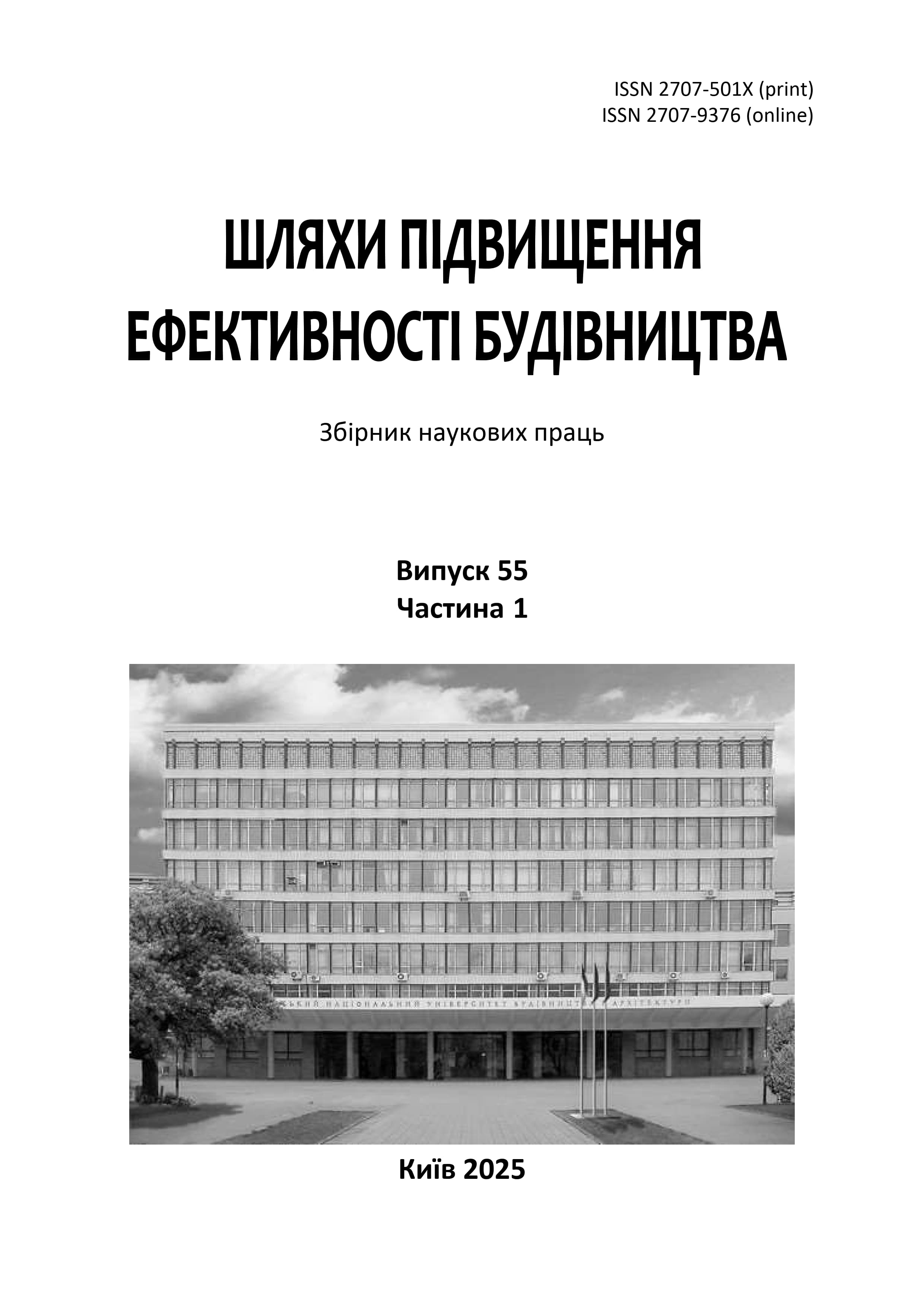Functional coordination of the activities of consulting and engineering companies with the main stakeholders of a construction development project
DOI:
https://doi.org/10.32347/2707-501x.2025.55(1).217-229Keywords:
functional coordination, consulting, engineering, development, construction project, stakeholders, risk management, digitalization, strategic planning, sustainable developmentAbstract
Functional coordination of the activities of consulting and engineering companies with the key stakeholders of a construction development project is a crucial factor in ensuring the efficiency, predictability, and sustainability of its implementation. In the context of a dynamic real estate market, the complexity of development projects is increasing, which requires the involved parties not only to possess professional expertise but also the ability to integrate and manage strategically. Modern construction processes involve a wide range of participants, including developers, investors, contractors, government regulators, public organizations, and end consumers. The interconnections between these entities must be clearly structured, which necessitates the involvement of professional intermediaries in the form of consulting and engineering companies.
Consulting companies play a leading role in defining the project strategy, analyzing market risks, financial planning, and providing legal support for transactions, while engineering companies offer technical expertise, innovative solutions, and quality control of work performance. Their effective interaction with project stakeholders helps minimize costs, shorten construction timelines, and enhance the resilience and competitiveness of the development product. Optimizing communication processes between these companies and key project participants requires the development of flexible management mechanisms, including the use of digital platforms, integrated document management systems, and risk forecasting analytical tools.
A key aspect of functional coordination is managing conflicts of interest that arise during decision-making. The presence of institutional and regulatory mechanisms that govern the distribution of responsibilities among participants helps improve the transparency of development processes and strengthens trust between the parties. The implementation of sustainable construction concepts, which consider environmental, social, and economic factors, is also important as it promotes the harmonization of interactions between public and private institutions.
Research into the functional coordination of consulting and engineering companies within construction development projects enables the development of effective management models that contribute to cost optimization, enhanced project implementation quality, and the strengthening of developers' market positions. The development of this field is an integral part of the transformation of the construction sector amid increasing competition and digitalization of the economy.
References
Chupryna I., Tormosov R., Aryn A., Horbach M., Prykhodko D., Polzikov M. The Updated Tool for Selecting Projects for the Target Programs of Sustainable Energy Development. 2023 IEEE International Conference on Smart Information Systems and Technologies (SIST), Astana, Kazakhstan, 2023, pp. 457-467.
Jenkins, R. Digital Platforms for Project Management: Trends and Applications. New York: Routledge, 2021. P. 102-106.
Johnson, M. Digital Transformation in Adaptive Management Models. New York: Springer, 2021. P. 105-109.
Johnson, M. Integration of Management Approaches in Building Development. New York: Springer, 2021. P. 200-205.
Kowalski, P. Project Management and Risk Analysis in Construction. London: Springer, 2020. P. 56-60.
Smith, J. Adaptive Models in Construction Project Management. London: Cambridge University Press, 2020. P. 115-120.
Wang, Y. Predictive Models for Construction Projects in Unstable Markets. Journal of Construction Management, 2023. P. 232-245.
Рижакова Г.М., Чуприна Ю.А. Формування будівельного кластеру у форматі державних інвестиційних цільових програм. Шляхи підвищення ефективності будівництва в умовах формування ринкових відносин. Вип. 40. 2019. С. 19-24. http://ways.knuba.edu.ua/issue/view/11913
Коваленко О.М. Інноваційні моделі управління будівельними проєктами: теорія і практика. Київ: Видавництво КНУ, 2022. С. 156-160.
Козак А.І. Консалтинг та інжиніринг у будівельному бізнесі: стратегічний підхід. Львів: ЛДУ, 2022. С. 112-118.
Кузьменко Т. М. Інновації в управлінні будівельними проектами. Київ: Прем'єр, 2022. С. 78-84.
Панасюк В.В. Математичні моделі управління фінансами в будівельних проектах. Київ: КНУ, 2022. С. 215-220.
Панасюк В.В. Моделі управління будівельними проектами в умовах змінного ринку. Київ: КНУ, 2022. С. 157-162.
Петренко І.О. Управління проектами в будівництві: основи, принципи, методи. Київ: Наукова думка, 2021. С. 34-38.
Радченко С.О. Інноваційні стратегії в управлінні будівництвом. Львів: ЛДУ, 2021. С. 99-103.
Шевченко О.В. Стратегії управління ресурсами в будівництві: ефективність та інновації. Харків: ХНУ, 2023. С. 44-50.
Downloads
Published
How to Cite
Issue
Section
License

This work is licensed under a Creative Commons Attribution 4.0 International License.
Authors who publish with this journal agree to the following terms:
- Authors retain copyright and grant the journal right of first publication with the work simultaneously licensed under a Creative Commons Attribution License that allows others to share the work with an acknowledgement of the work's authorship and initial publication in this journal.
- Authors are able to enter into separate, additional contractual arrangements for the non-exclusive distribution of the journal's published version of the work (e.g., post it to an institutional repository or publish it in a book), with an acknowledgement of its initial publication in this journal.
- Authors are permitted and encouraged to post their work online (e.g., in institutional repositories or on their website) prior to and during the submission process, as it can lead to productive exchanges, as well as earlier and greater citation of published work (See The Effect of Open Access).

